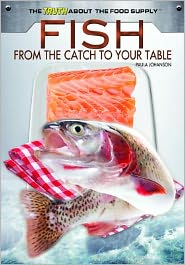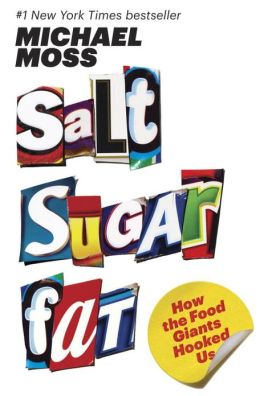Friday, August 16, 2013
Books!
I read what seems to be a lot of books. I don't really think it is--I read around 80-100 books a year, mostly non-fiction, and mostly about food issues. When compared to my Significant Other, the writer Paula Johanson (author of, among others, Fake Foods: Fried, Fast and Processed and Fish: From the Catch to Your Table and the codifier of Johanson's Law: "When a system achieves the same outcome regardless of stated goals and altered tactics, then the outcome is the goal"), I really don't read all that much--she probably averages 200 books a year. Even among my peer group, I don't read all that much--but my peers aren't exactly a statistical snapshot of "average" Canadians.
I mention this only because I've had a pretty good run, recently, of interesting reading. Michael Moss' Sugar, Salt Fat started the run.
I really enjoyed the read--Moss looks in depth at the way in which each of the three titular ingredients affects the "food" we eat. Along the way, we get a history of the industrialization of food and an excellent example of how Johanson's Law can be applied: for all that the food companies claim to want to serve us safe, nutritious food, we still get food that is addictive, damaging to the environment and the public, and very very profitable. Thus, the stated goal is the smokescreen, the desired outcome is the one we are dealing with. After all, why would food companies want us to eat a nutritious and balanced diet? There's no real money in it. Maximizing profits, that's the real goal.
Wenonah Hauter's book, Foodopoly: The Battle Over the Future of Food and Farming in America, came in to my local library about the same time as Moss' book. While an excellent book, it did take me a bit longer to get through than SSF--Hauter, while a strong writer in clear command of her facts, isn't quite the writer that Moss or Michael Pollan are. This is not intended as a slam, she just took a bit longer to read.
But what caught my attention the most was when Hauter wrote about the clear policy of both Corporate America and the US government to empty the family farms and drive the population into the cities. Despite the rhetoric of "saving the family farm", governments were, and are, dedicated to their destruction. In this light, the survival of any family farm is a much bigger deal; mid-size mixed farms are explicitly targeted for dissolution by public policy.
This policy includes forcing smaller firms to meet the same "food safety" guidelines as the large commercial processors like Tyson: this is without regard for the fact that most of the public health related problems we see with big processors are artifacts of big processing. If you're a small abattoir killing a few animals a day, it is a relatively simple operation to trace product from farm to plate. Large processors, slaughtering a thousand animals a day in a plant, have no intention of providing that level of accountability. The practice of mixing, for example, the ground remains of a thousand cattle into one batch of burger beef pretty much ensures that trace-ability of any one animal is lost. Currently, the large animal processors are fighting COOL, or Country Of Origin Labelling, in the US in order to continue the practice.
Last week I was informed that Michael Pollan's new book, Cooked: A Natural History of Transformation, had come into the library and was being held for me. Yay! I headed down and snagged it, but made the mistake of looking through the Recent Arrivals shelving before leaving the library. And that's where I discovered Pandora's Lunchbox: How Processed Food Took Over the American Meal by Melanie Warner.
Now, I have a problem with libraries and books. I frequently walk out of libraries (and formerly bookstores) with more books than it is physically possible to read in a set length of time ie: before they are due back at the library, or before I went into another bookstore. Both Paula and I must remind ourselves that other people need books too.
So now there's a problem: which book, the Pollan or the Warner, to read first? On the walk back home, I had to stop at the University of Victoria McPherson library and scan a couple of pages out of a book I had from there: the prescient and superb Food Banks and the Welfare Crisis by Graham Riches.
The problem is, it was another library with another Recent Arrivals display. And out front? The Industrial Diet:The Degradation of Food and the Struggle for Healthy Eating [.pdf of ToC and introduction] by Anthony Winson from the University of Guelph. Of course I took it home. What part of book addiction is unclear?
So, sitting on my Books To Read shelf are: Cooked, Industrial Diet, Pandora's Lunchbox, Food Banks and the Welfare Crisis (almost finished), Poverty and Famines (Amartya Sen's classic), and Bread Lines Knee Deep in Wheat. This doesn't include the books I've purchased over the last couple of months either.
Thankfully, the Pollan has proved to be an accessible read--his ability as a writer makes the book flow, and the information comes across as something you've just remembered, rather than something you've got to learn. The breakdown into the four elements makes for logical pause points too, and the book is a great read, filled with explorations and side jaunts that create an organic feel to the worlds of cooking he explores.
But what about all these other books? I'll probably read Pandora next--it looks to be a quick read, which I could use right now. Industrial Diet looks to be really interesting, but a bit information-dense. Not a bad thing, just looks like it will demand a lot more care and attention in the reading. The Sen is almost finished, as is Food Banks, so that leaves me putting off Breadlines--and that's a book I've been wanting to read for over a month now.
That's it--no library or bookstore trips for at least three weeks!
Subscribe to:
Post Comments (Atom)






No comments:
Post a Comment